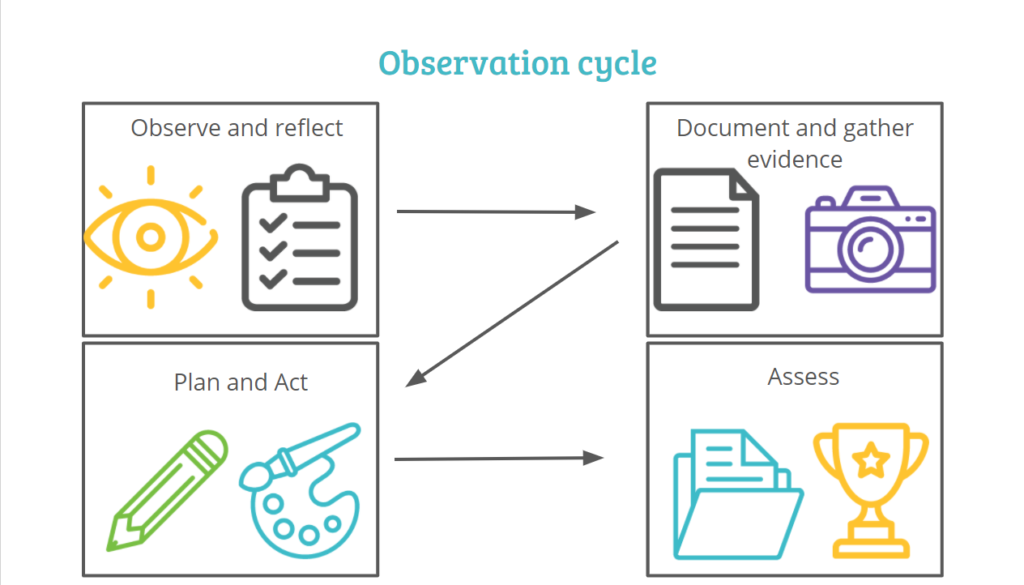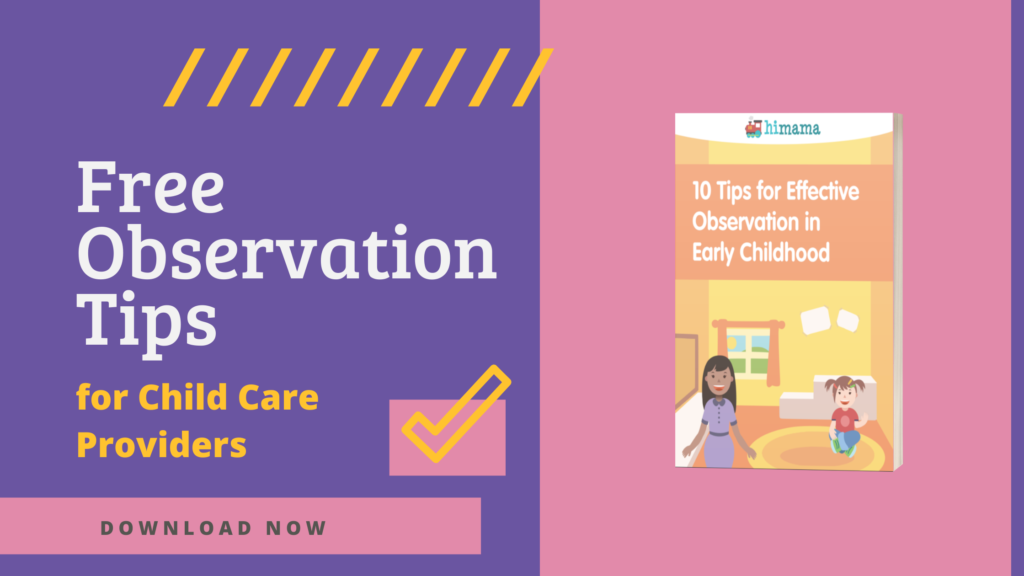Observations are part of the day-to-day life of an early childhood educator. Most childcare providers understand the role of observation but do they understand why it’s important? Early childhood education is not just about educating children. It’s about exploration, learning, and observing play. Educators play an important role in helping children meet developmental milestones and observation is how educators learn more about each and every child they work with.
Observation is often seen as one of the most simple, yet effective methods of assessing young children as they develop. For an early childhood educator, observing a child begins by noting how each child behaves, learns, reacts to new situations, and interacts with others. An educator then takes this information and creates activities to promote growth in skills, document the success of those skills, and then reflect and assess.
What is observation in early childhood education? 🤔
Observation is the process of tracking children’s behavior over a period of time. Through meaningful and detailed documentation, educators are able to see patterns and plan age-appropriate activities, gain insight into how a child thinks about the world, and provide opportunities to change the learning environment to promote growth and development. The history of early childhood education explains many of the influences that have shaped the field of early childhood education into what it is today.
Why do we observe children’s development? 🧐
When an educator sits back and observes a child within their care, they can then better understand the children’s strengths or weaknesses. Through observations, educators’ programming can help make improvements to the environment and facilitate learning.
Observation of a child’s behavior can:
- Help an educator better understand why a child might be having challenging behavior
- Identify special needs
- Better understand the child
- Allows for documentation of skills
- Shows the child’s communication style
- See what their interactions with their peers are like
Observation focuses on how: how did the child get there vs. the product the child used. The observation process is very straightforward: observe and reflect, document and gather evidence, plan and act, and finally, assess. Try using this free template! You only assess over long periods of time. Typically once every six months depending on the type of assessment you are using.

What are the types of documentation? 📋
Having evidence of skill growth helps gain better insight into where a child is at. Having meaningful interactions when a child is playing can allow for the project to continue over long periods of time and keep the child’s interest up.
- Written observations with language samples. Example: Bobby is building with the blocks. He is stacking all the square blocks and then topping them off with a triangular block. When I asked Bobby what he was creating his response was “This is my house, because it has a point at the top”.
- Drawings or attempts of writing – Grab that picture before it ends up in the recycling!
- Pictures of creations – Take a moment to capture that masterpiece before tidy-up time!
- Videos – Videos can be so powerful and if you are using digital documentation it’s much easier to catch those moments!
- Learning stories with direct links to skills – Typically add a picture and tag with a skill from your framework.
Observations also help build progress reports (try using this free template!). Typically, centers will have ongoing tracking of each child’s skills and development and report these back to families. This is the initial step before going into an assessment.
What do educators track?🔀
Educators look to help grow the child as a whole and want to encourage growth and development of skills in all areas. The primary areas of focus are:
- Cognitive development
- Physical development
- Social development
- Emotional development
- Language and literacy development
Depending on the style of teaching or curriculum there may be other areas of focus but these will always be the key ones. Each of these areas of development impact one another.
Observations and assessments📓
You’ve been gathering observations, changing the environment around, and providing meaningful activities to promote growth, now what? Well, as children learn more skills and adapt to different situations, you have evidence gathered to prove this. Through pictures and written observations that you have gathered, it’s now time to reflect on all this hard work and assess. Assessments can’t be done without evidence and observations are a huge piece of evidence. There are many different types of assessments you can choose to do, but first, make sure you have been trained on how to assess properly. Some assessments are as simple as a checklist and some require certification. Also, make sure the assessment you use is approved in your area and ties to the values and teaching style of your center.
Connect with parents👨👨👧
The final piece to observations is bringing this information back to parents and working with them directly to make sure the child is supported both at home and in the classroom. Have meetings with parents to not only discuss any ongoing issues or problems but also to plan what the goals are for their child. With a good working relationship with parents, a child can be very successful.
Tying these all together is no easy task and for many educators, it is very time-consuming, but it is very important. Many centers have made the switch to HiMama because of this. Within the app, teachers can tag skills, observe, reflect, and then assess using work sampling or ounce. All the while sharing updates with families! Today with COVID-19 on the doorstep, having open communication with parents is very important as many can not come in the center to observe how the classroom is growing.

Related Posts
- Why Observe Children at Play?
- Types of Child Care Observation
- How to Make Health and Wellness Observations in Early Education
- Child Care Observation: How Much Documentation is Too Much?
Photo Source – University of Alaska.
Before you go…
Is your center prepared for today’s childcare expectations?
Parents are looking for centers that offer digital parental communication, observations and assessments, shared photo and video updates, and contactless check-in and billing.
HiMama is an all-in-one app to help you with all that, and boost your enrollment! Get a FREE 15-minute tour with us here.



this was very helpful and i am clear about how to observe learners at school
Hi Mama, Thank you so much for offering the free ebook. Now I can refer back to it if need be. Also, it’s very easy to understand.
a very useful blog helped a lot in my assighnments
Would you send one observation.
The link isn’t working for me to download the ebook?
Never mind. I just had to use the google app instead. Thank you for this very helpful information!
thank u so much for the infomation.it really helped me.
Please will you provide more information about how we observe the child in nursery as a teacher
Thanks you for your information in ECE. It has helped me a lot.More needed.
Can you please show me how to observe 3 children in 2 weeks
I have learned more about the importance of Observation and assessment. Thank you. Excellent job.
Thanks so much for this post, it has been of great help to our early childhood education center. More on evaluation in early childhood. Thanks Francisca Ifeoma from Aba,Abia State of Nigeria.
Good work done
Commonly heard responses are that early care and education (ECE) professionals observe children to monitor progress, to complete required assessments and screenings, and to identify learning or behavior challenges. Observation is a core piece of the assessment process and continuous quality improvement (CQI) planning. ECE professionals use observation to document a child’s learning and to inform teaching practices. But another reason for observation is to spark learning and development.
Yes! This is absolutely true! thank you so much for shedding light on this!
I have been trying for several weeks now to download the ebook full of extra tips on how to observe children in the classroom. The link just refuses to work for me. Please can you assist.
Kind regards Karen
Hi Karen, we just emailed you a copy of the e-book. Hotmail may have put a block on our emails to you 🙁 Let me know if you have any issues opening the e-book and we hope you enjoy our resource!
Hello, Link is also not work for me Kiah. I tried many times 🙁 Please help me
It is great to know that an educator can create activities to promote growth in skills, document the success of those skills, and then reflect and assess. My husband and I want our two kids to excel and develop their skills even at a young age. With this, we will look for a preschool on Monday that can encourage learning and growth in a safe environment.
It’s interesting to know that an educator will observe how a child behaves, learns, and reacts to new situations. I would love to know about that when I send my son to a child care center this year. It will help me understand him more and also find ways to ensure that he grows into a good person aside from learning easily in class.
Thank you for this e-book as it contains significant information that I can refer to anytime.
It’s interesting to know that educators would observe the child know their strengths and weaknesses to help them in making improvements in the environment and facilitate learning for them. I hope to find an early learning centre with educators like that for the best outcome in the academic life of my firstborn. He will start going to school next year, so I want to be informed when I start looking for a school that I can trust soon. And that would be one of the things that I will look for.
It’s great that you mentioned that educators help children grow as a whole. My son will be turning two soon, and I want to find an early childhood program that can help with his development. I am hoping that early childhood development will help set him up for success later in his life.
This is so helpful thanks so much for everything as a practising ECD it’s of great help
It is actually a very good idea to observe the child’s development through observation. There are many things that one can learn from assessing toddlers. This can also help the educators in evaluating the performance of the children. Thank you for sharing all this information with us through this blog post. I have learnt many things through this article.
I think, what is it — a false way. And from it it is necessary to turn off.